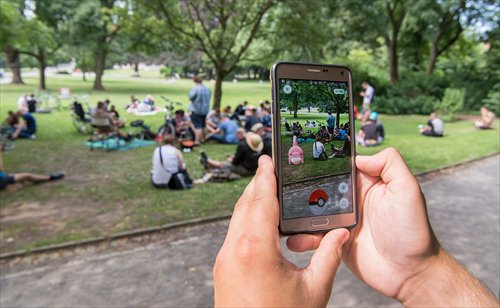HOME >> ARTS
Germans join Pokemon hunt as hit game reaches Europe
Source:AFP Published: 2016/7/14 18:28:00

A person plays Pokemon Go. Photos: IC
German social media was abuzz with the augmented reality game Pokemon Go on Wednesday, as the country became the first in Europe where fans could download the global sensation.
But its arrival also quickly came under fire, including from the Auschwitz museum in Poland, which asked the game's makers to block players at the former Nazi death camp out of respect for the dead.
Others expressed concern about the safety of the game, although mostly there was happy enthusiasm.
"I was out hunting Pokemon with my mother and my dog. And I wasn't the only one. I saw at least 15 others out, too," wrote one Twitter user, Fenrir.
"Thanks to Pokemon Go, I walked 16,000 steps today," tweeted Nina.
Since July 5, the game has been available only in the US, Australia and New Zealand, even if some Europeans fans succeeded in downloading copies by pretending to be connecting from those countries.
But it officially became available in Germany on Wednesday. And AFP journalists were able to download the game from Apple's iTunes store and Google's Play store in Berlin.
Players can join for free and set off on a quest to collect the 250 cartoon "pocket monsters" first conceived for the primitive Game Boy handheld in the late 1990s.
The novelty of the latest version is that it involves collecting the monsters by physically moving around in real life.
GPS chips in players' smartphones are used to map their real-life movements onto the game world, while software overlays the 3D characters onto the view through the phone's camera.
Auschwitz says no
But not everyone in Europe was celebrating the arrival of the polygonal creatures.
The Auschwitz museum in southern Poland said it had asked the studio Niantic Labs, which developed the game, to remove Auschwitz from the application's possible locations.
"We find this kind of activity inappropriate. It's here that hundreds of thousands of people suffered: Jews, Poles, Roma, Russians and individuals from other nations," museum spokesman Pawel Sawicki told AFP.
"Generally speaking, we want to raise awareness among game developers regarding respect for the memory of the victims of this largest Nazi death camp from World War II."
One million European Jews died at the camp set up by Nazi Germany in occupied Poland in 1940-45.
In Berlin, users reported that Pokemon could be caught at the German capital's enormous Holocaust memorial and at the locations of some "Stolpersteine" - plaques in the pavement that commemorate Jewish families deported and murdered during the Nazi terror regime.
Washington's Holocaust Museum has also complained of visitors playing the game within its walls.
It is not the first time that Niantic has faced such criticism.
In June 2015, in-game elements for its previous title Ingress could be discovered at Auschwitz, as well as the Sachsenhausen and Dachau concentration camps in Germany, sparking protests from museum authorities.
Real-life consequences
Pokemon Go has already had negative real-life consequences for some of its players around the world.
One Australian expat in Singapore was fired after just a week in a new job after complaining that "You cant fucking catch pokemon in this piece of fucking shit country" on Facebook, provoking a furious backlash.
And the gameplay - which requires players search in different environments corresponding to monsters' characteristics, including grass, water, and fire - has caused safety concerns.
German automobile association ADAC warned that the game "could increase even further danger from getting distracted for drivers and pedestrians."
"Parents should play the game together with their children and point out the dangers," the civil society organization continued in a statement released on Wednesday, noting that accidents involving distraction by smartphones had sharply increased in recent years.
Newspaper headline: It’s time to go!
Posted in: Video Games